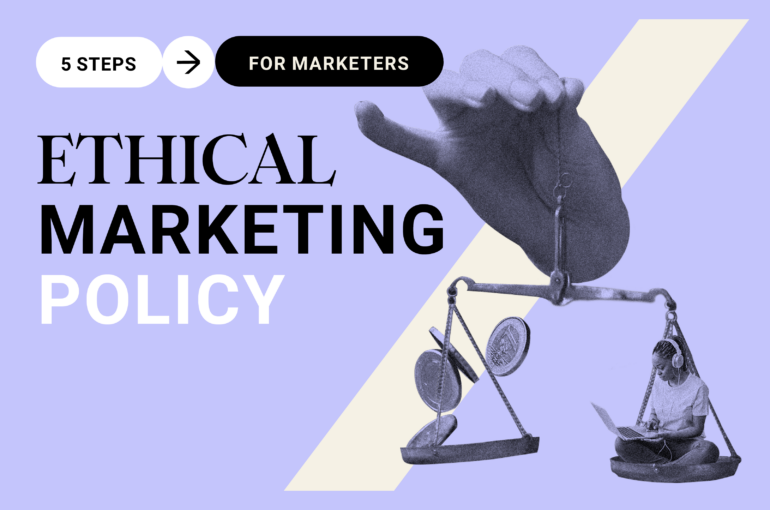How to create an Ethical Marketing Policy? A 5-step guide for marketers

More and more businesses – especially Certified B Corporations – are adopting an ethical marketing policy. But what does that mean? What should it look like? How should a company begin the process of creating their own ethical marketing policy? Here’s a straightforward guide to help you create an ethical marketing policy in five steps.
What is an ethical marketing policy?
An ethical marketing policy is a set of guidelines and principles that ensure a company’s marketing practices are fair, transparent, and respectful of consumer rights and societal norms. This policy goes beyond legal compliance to embrace best practices that promote honesty, integrity, and social responsibility in all marketing activities.
Step 1
Define Your Ethical Principles
Start by clearly defining the ethical principles that will guide your marketing efforts. These principles should reflect your company’s core values and the expectations of your stakeholders, including customers, employees, and the community. Common principles include honesty, transparency, fairness, respect, and social responsibility.
EXAMPLE
Lush is a campaigning company.
Lush actively campaigns on the issues of Animal Rights, Human Rights and Environmental Protection. All Lush licensed territories are expected to campaign at least once a year on one of the core values through their shops and website . (see full ethical charter)
Step 2
Secure Honesty and Transparency
Truth and Accuracy
Formulate a statement on how truth is ensured in all your marketing communications. Define specific steps you will take to guarantee honesty and transparency in your messaging. Consider including examples of unacceptable practices to make your point clear.
Transparency
Transparency is crucial for building trust within your community. Determine how you will communicate about your products, services, and marketing strategies. This includes disclosing sponsored content, affiliates, or potential conflicts of interest.
EXAMPLE
We strive to communicate clearly with all.
We will not imply that expressions of opinion are objective claims or make any subjective claims that might mislead the consumer.
On our social media channels, we respond to genuine questions and queries and will assist with redirecting concerns to the relevant people. If we require additional information or personal details, we may re-direct you to private messages or to our website where your details can be securely sent.
We are fair to our competitors. Our communications do not denigrate or ridicule competitors or their products, other firms, organisations, or persons. We do not make unjustifiable use of the name, logo or trademark of another firm or institution, and do not take undue advantage of the goodwill belonging to others. (source)
Step 3
Commit to Cultural Sensitivity and Child Protection
Cultural Sensitivity
Marketing campaigns and messages can sometimes unintentionally be insensitive. Strive to improve by ensuring your marketing embodies cultural sensitivity. Articulate the reasons behind your commitment to cultural sensitivity in your policy and outline specific steps you are taking to align your marketing efforts with this commitment.
• Unacceptable Practices: Avoid using stereotypes, cultural appropriation, and any disrespectful portrayal of groups.
• Adopted Practices: Promote diverse representation, consult with cultural experts, and ensure all marketing content is respectful and inclusive.
Children
If your audience includes children, describe special considerations for communicating with this audience. Commit to adhering to ethical standards and protecting the well-being of young consumers.
Step 4
Create a list of reflective questions and train your team
Reflective questions
Implementing a set of reflective questions for everyone involved in a campaign can help ensure ethical marketing practices. Team members should regularly ask and discuss these questions to keep the marketing efforts aligned with ethical standards. These questions should cover various aspects of marketing, including advertising content, social media engagement, data privacy, consumer interactions, cultural sensitivity, and child protection.
ACTION POINT
Organize training sessions and workshops for your marketing team.
Step 5
Monitor and Review
Ethical marketing is an ongoing process. Regularly monitor your marketing activities to ensure compliance with your policy and be prepared to make adjustments as necessary. Collect feedback from stakeholders and stay informed about changes in laws and consumer expectations.
ACTION POINT
Establish a monitoring system to track your commitment to your ethical guidelines. Schedule periodic reviews of your policy and procedures to identify and address any gaps or areas for improvement.
Conclusion
Creating an ethical marketing policy is a crucial step towards building trust with your audience. By defining clear principles, understanding legal standards, developing actionable guidelines, training your team, and continuously monitoring your efforts, you can ensure that your marketing practices are both ethical and effective. Embrace these steps, and you’ll not only do right by your customers but also pave the way for sustainable business success.
This piece was written by Margreet van Schaijk.